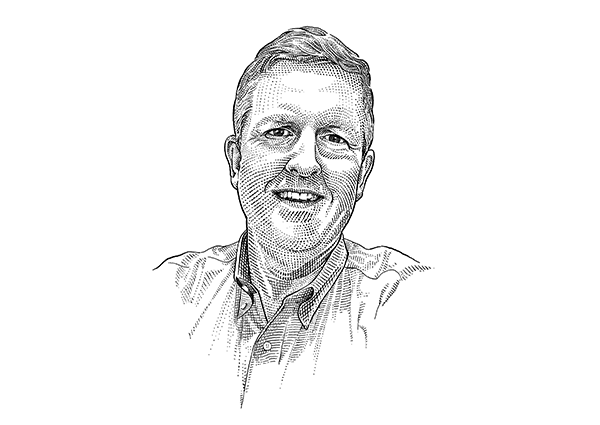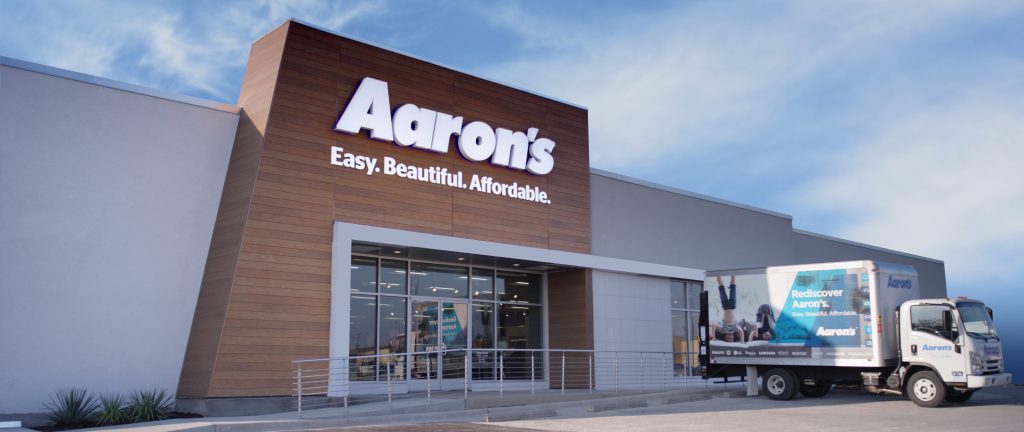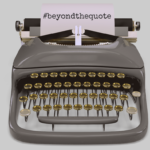After originally pursuing a career as a Georgia Tech trained electrical engineer, John Trainor’s professional journey took an unexpected turn into the technology sector. As someone who has always enjoyed solving complex business challenges, he was well positioned to ascend to the CIO role for Aaron’s, an industry leader in the specialty retailing of furniture, consumer electronics, home appliances and accessories through direct sales and lease ownership.
At nearly 20 years with the company, John continues to reinvent his role, explore digital opportunities and find ways to deploy assets to provide an exceptional customer experience for this respected brand.
We had the opportunity to sit down with John and discuss his biggest influences, the perspective he gained from a failed startup, and his team’s success in digitizing the in-store experience to shorten the checkout process, establishing business confidence and increased customer satisfaction.

Walk us through your CIO path. How did you decide to pursue a career in technology, and how did you progress to your current organization?
Bubba Sparxxx, a hip-hop artist and philosopher has a line that says, “I didn’t choose rhyming. Rhyming chose me.” In a similar vein, I would offer that I really didn’t choose technology rather IT chose me.
Originally, my plan was to become an electrical engineer. On my first co-op job at Georgia Power, I was hired for an electrical engineering project, but before I knew it, I was the resident computer expert on the engineering team. I would get so absorbed in tackling complex problems, and I’d get a thrill out of solving those challenges.
After my internship and nearing completion of the requirements for graduation, I had the opportunity to work with US State Senator Paul Coverdell as his Manager of Information Systems. I was still taking classes at the time and serving as the Student Body President at Georgia Tech.
Needless to say, it took me a little extra time to finish my degree, but I was able to do some cool stuff along the way.
In my first job post-college, I worked on a billing system at Southern Company for two years before making the move to Aaron’s. My hiring manager at Southern Company became the first CIO at Aaron’s, and he recruited me directly.
Several years later, a friend was named the CEO of a mobile marketing startup. He convinced me to take the entrepreneurial leap as his CTO. Shortly thereafter, the company ran into funding issues and was challenged with making payroll. Realizing that I had options, I knew that I was the easiest member of the leadership team to exit. I had left Aaron’s in June but was back by November of that same year. I would not trade that startup failure for anything. It gave me a great perspective on what I needed to do to be better at my job. Aaron’s was home and I was energized to be back. Three years later I was named CIO.
Would you consider yourself a CIO, a CTO, or a hybrid? Why? What are the essential differences?
I would offer that I am more of a CTO than a CIO, although my title is CIO & SVP of Digital Products. It is my responsibility to pursue digital opportunities and to exploit assets we already have in our portfolio to provide capability to our customers.
I have been blessed with a phenomenal team that is aligned in this thinking. We challenge ourselves daily to automate and work ourselves out of a role. We know if this is our approach, we will always deliver the most business value possible.
What initiatives have you overseen to date in your time with your organization? What’s on the horizon?
It’s been an exciting roller-coaster ride, as during my tenure we have grown from 450 stores to over 1,800. I’ve had the opportunity to participate in the scaling of the business, although we quickly realized as an IT organization that we were not innovating within the business. This was not healthy for continued growth and presented an opportunity for us.
In 2014, we purchased a company called Progressive Leasing. They are a phenomenal organization with a strong innovation culture. They were just a $400 million revenue company five years ago, and now they are at $2 billion. The introduction of this company has influenced the innovative mindset of our entire company. We leveraged some of their machine learning and decisioning capabilities and have built a $100 million e-commerce business rapidly over the past four years. This introduces us to younger customers and opens a really broad market that we were not looking at previously.
Building on that we are now digitizing the in-store experience. We have implemented a digital onboarding solution that uses machine-learning capabilities to reduce a 45-minute checkout process to only 10 minutes with a high degree of confidence and great customer satisfaction.
How do you foresee your organization being different in two years, and how do you see yourself shaping that change?
What I think will be different is, as we introduce more digital capabilities and work very hard to simplify our processes, that we are going to push the change management boundaries of our technology organization and the business as a whole. Over the next few years, there is going to be a radical difference within our enterprise and there will be many steps in that transformation. In this journey, I know that we are going to provide the easiest, most affordable set of products for our customers.
What personal traits and attributes are essential for today’s CIO versus 10 to 20 years ago?
I was talking a few years ago to a good friend of mine who is an HR leader at Home Depot. I was lamenting to her that when I became a CIO that, if all the lights are blinking green and the hard drives are working, that I was getting a gold star on my report card. Now, none of that matters. The key to success now as a technology leader is navigating ahead of business challenges. This is the new role of a CIO.
Share your thoughts on the availability of IT talent. What strategies do you employ, and what’s different in your organization?
Finding the right talent in this market is quite difficult. I know that we need to communicate the “why” behind what we’re doing, and make sure to find the right talent to communicate that “why” to the team. If you acquire the right talent, then get out of their way and if you have done a good enough job explaining the “why,” they are going to do awesome stuff.
How do you decompress from the challenges of being a CIO? What do you do for fun?
Being active is very important for me. In fact, I really have no choice as my wife sets a very high bar for our family and has recently completed a marathon in each of the 50 states. She has set a great example for my three sons and me, so I run regularly and have competed in triathlons. I will usually do a long run on Saturday from four to 10 miles and then cycle on Sunday. I also do Pilates, which is phenomenal for cross-training.
Who have been your biggest influences and why?
My mom and dad, who have both passed, were huge influencers on my life. My dad came from very humble means, and I don’t know a time other than when he retired where he wasn’t working two or three jobs. While working hard he also set a great example of how to humbly serve others including his family, church, and community.
My mom knew how to push boundaries. She was a teacher, and when she saw kids being underserved for school trips, she cashed in her retirement and started a group trip company. She never made a ton of money, but she was able to travel the world and meet interesting people. Her focus and drive were phenomenal.
Which books have you gifted the most over your career?
One of the best books that I’ve read is “Extreme Leadership” by Willink/Babin. The book does a great job of explaining the concept of how there are no bad teams, only bad leaders, and it’s your responsibility to check your ego and figure out how to be a great leader. Also “Getting Things Done” by David Allen is a little bit dated, but the concepts are very liberating.
Lately, I’ve been reading “The Obesity Code” by Dr. Jason Fung. I think it’s a great book to explain how obesity happens, and I think that, as you look at the obesity epidemic, it’s an important thing for people to pay attention to.
If you weren’t doing the job that you have today, what would be your dream job?
If I were to retire today, I’d be a teacher in some aspect of technology. Now if I had to do my career over again, I probably would have been drawn towards the law as I enjoy the problem solving that is done by attorneys.
However, if money were no object, I would be a photographer. I’m a pretty good photographer, and I love to shoot. Lately, I have shot a lot of sports when my sons were in high school and have become pretty good with football photography, which doesn’t seem like it should be that hard, but when I look at year one versus year five, there’s a giant difference in the quality of my work.
What would you want our readers to know about you that we haven’t asked?
If I could summarize what would be most important in life, it would be this: in all aspects think about whether you are building people up or whether you are tearing people down. If the latter, fix it immediately.
I would add as well that serving as a CIO is a hard job. I would not want to paint that the journey is all roses as not everything goes according to plan. Rapid change can be very messy in the middle. I just make sure to learn from those challenges and continually work to improve my craft. I don’t want to sound like we’ve got everything figured out, because we absolutely don’t, despite there being a lot of things we do right.










